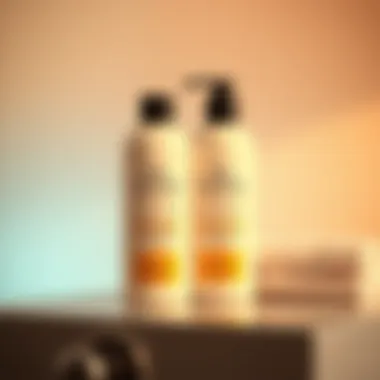Best Shampoo and Conditioner for Thinning Hair


Intro
In today's fast-paced world, maintaining healthy hair often takes a backseat to more pressing concerns. However, for those dealing with thinning hair, taking proper care becomes essential. Understanding the root causes of hair thinning, along with the right shampoo and conditioner choices, can make a world of difference. It's not just about aesthetics; it affects self-esteem and overall well-being.
Thinning hair can stem from various factors, including genetics, hormonal changes, stress, and even dietary deficiencies. As such, it is crucial to discern which hair care products to use. This article will provide you with a detailed guide to optimal shampoos and conditioners tailored for thinning hair.
Through careful product evaluation, ingredient breakdown, and valuable insights, you'll be better equipped to select products that best meet your unique hair requirements. Plus, practical tips on how to use these products effectively will help maximize their benefits. It’s time to empower yourself with knowledge and take charge of your hair health.
Let’s dive into the latest trends and insights surrounding hair care for thinning hair, paving the way to healthier, fuller-looking locks.
Understanding Thinning Hair
When we talk about thinning hair, we're addressing a concern that affects a wide array of people, regardless of age or gender. This phenomenon can cause not only physical changes but also emotional ones, leading to self-esteem issues and anxiety. Therefore, understanding what's behind thinning hair is crucial. Knowledge equips individuals with the power to make informed decisions about their hair care, thereby improving overall hair health.
What Causes Thinning Hair?
Thinning hair can stem from a variety of causes. Often, it starts with a change in the growth cycle of hair. Typically, hair goes through phases: growth, rest, and shedding. When disruptions occur, it can lead to more hair falling out than usual. Some common causes include:
- Hormonal Imbalances: Conditions like thyroid disease or hormonal changes during pregnancy.
- Nutritional Deficiencies: Lack of essential vitamins and minerals, like Iron and Vitamin D.
- Stress: High stress levels can trigger hair loss, commonly referred to as telogen effluvium.
- Aging: Many individuals naturally see hair thinning as part of the aging process.
Recognizing the specific cause can help direct appropriate treatment.
Significant Factors Affecting Hair Density
Aside from genetic predispositions, several significant factors can have a major impact on hair density. These include:
- Dietary Choices: Eating a poor diet lacking in protein can adversely affect hair growth.
- Medical Conditions: Conditions like PCOS or specific autoimmune diseases can lead to hair thinning.
- Medications: Certain medications for conditions like arthritis, depression, and heart disease can cause hair loss as a side effect.
- Hairstyling Practices: Overuse of heat styling tools or harsh chemical treatments can weaken hair.
Taking these factors into account when evaluating hair health is vital.
Genetics and Hormonal Influences
Genetics plays a substantial role in hair thinning. If your parents experienced thinning hair, the likelihood of you facing similar issues can increase. Additionally, hormonal influences can either exacerbate or alleviate hair thinning. For instance, androgens, often linked to male-pattern baldness, can also impact women, especially during menopause. This goes to show that both heredity and hormonal levels are paramount in determining hair vitality.
Environmental Impact on Hair Health
Environmental factors can't be overlooked either. Pollution, for instance, can accumulate on the scalp and weaken hair over time. UV rays from the sun can also damage hair structure, leading to dryness and breakage. Furthermore, exposure to harsh chemicals in swimming pools can strip essential oils from hair. Simple practices like wearing hats or using UV-protectant hair products can help shield hair from these damaging elements.
In summary, understanding thinning hair involves recognizing its causes, influences, and environmental factors. This knowledge brings necessary insights for selecting effective shampoos and conditioners, guiding you on the path to improved hair health.
Key Ingredients to Look For
When it comes to tackling thinning hair, selecting the right products is half the battle. Just as important as finding a shampoo or conditioner that suits your style is knowing the magic ingredients that can work wonders for your locks. The right ingredients can help nourish, strengthen, and revitalize your hair from the roots to the tips. This section dives into some critical components to consider while shopping for your hair care arsenal.
Biotin and its Role in Hair Growth
Biotin, also known as Vitamin B7, has gained a reputation as a powerhouse for hair growth. When you experience thinning hair, your scalp might not be receiving adequate nutrients to support healthy growth. Biotin plays a pivotal role in producing keratin, which, as we shall see later, is essential for maintaining strong and vibrant hair.
Including biotin in your shampoo and conditioner can create a nourishing environment conducive to hair regeneration. Research suggests that biotin deficiency may lead to hair loss, making it crucial for those facing thinning issues.
Here are some benefits of biotin:
- Encourages cell growth: It helps to produce healthy cells that contribute to strong hair.
- Improves scalp health: A healthy scalp environment can prevent further hair loss.
- Enhances shine and strength: Regular use can lead to healthier looking hair overall.
If you want hair that feels strong from the root to the tip, seeking out products with biotin is a wise step.
Keratin: Strengthening the Hair Structure


Keratin is a protein that is a natural building block of hair. Many products boast keratin as a highlight in their formulas due to its ability to fortify and smoothen hair. Keratin treatment can help restore hair's natural protective layer, which usually gets stripped away by heat styling and environmental factors.
Incorporating keratin into your hair care regime can act as a cushion against breakage. Whether your hair is naturally wavy or straight, this protein can help maintain the structure and elasticity needed for healthy strands.
Some notable advantages of keratin include:
- Boosts elasticity: It allows your hair to stretch without breaking.
- Reduces frizz: Keeps your hair smoother and easier to manage.
- Promotes alignment: Ensures that hair cuticles are laid flat, resulting in a shinier appearance.
Caffeine: Stimulating Hair Follicles
Caffeine is often linked to your morning cup of joe, but it can also stimulate hair growth objectively. Research indicates that caffeine can penetrate hair follicles, promoting circulation and energizing them to encourage growth.
Products containing caffeine have been shown to not just stop hair loss but also to encourage regrowth. As hair gets the wake-up call from caffeine, it improves resilience against shedding.
Key benefits of caffeine for hair include:
- Increases blood flow: Improved circulation to the scalp can boost nutrient delivery.
- Blocks DHT: Dihydrotestosterone (DHT) is a hormone believed to be a key factor in hair loss, and caffeine may help counteract its effects.
- Strengthens hair: Promotes stronger strands that are less prone to breakage.
Essential Oils for Nourishment
Essential oils have long been celebrated for their healing properties, not just for general wellness but also for hair care. Oils like rosemary, peppermint, and lavender contain compounds that can nourish the scalp and stimulate hair growth. They can create a calming atmosphere while delivering hydration and other beneficial properties to your hair.
Incorporating essential oils into your shampoo or conditioner—or using them in tandem with other products—can amplify the benefits of your hair care routine.
Some popular essential oils and their benefits include:
- Rosemary oil: Known to stimulate blood circulation and promote growth.
- Peppermint oil: Can invigorate the scalp and promote a refreshing feel.
- Lavender oil: Offers calming effects and may help with hair shedding.
These oils can contribute significantly to the health and vitality of thinning hair, making them an excellent addition to your hair care strategy.
In summary, when searching for shampoos and conditioners aimed at combating thinning hair, be on the lookout for these essentiels. Biotin, keratin, caffeine, and essential oils provide not only nourishment but also critical support for hair growth and strength.
Choosing the Right Shampoo
Selecting the appropriate shampoo can drastically alter how your hair behaves, especially if it's thinning. While it may seem straightforward, with countless options on the shelf, informed choices are vital. The shampoo's formulation directly impacts cleaning, nourishing, and revitalizing your hair and scalp. Not all shampoos are created equal, so understanding the differences can save you from frustration and potentially worsen thinning hair.
Clarifying vs. Hydrating Formulations
When faced with the choice of clarifying versus hydrating shampoos, one must weigh their individual hair needs. Clarifying shampoos effectively strip away product buildup and oils from the scalp. This is particularly beneficial for those who frequently use styling products or have an oily scalp. However, overuse can lead to dryness, causing further damage, especially if your hair is delicate or prone to breakage.
On the other hand, hydrating shampoos are formulated to infuse moisture, making them suitable for dry or damaged hair. They help retain moisture and provide essential nourishment. For women with thinning hair, the right balance is crucial:
- If your scalp tends to produce excess oil, consider clarifying a few times a month.
- For regular use, hydrating shampoos should be part of your daily regimen.
Sulfate-Free Options: Are They Essential?
Sulfates have a notorious reputation in hair care discussions. Many mainstream shampoos include these cleansers because they generate that satisfying lather we often associate with effective cleaning. Yet, for thinning hair, sulfate-free options present a gentler alternative. While not absolutely necessary for everyone, skipping sulfates can soothe sensitive scalps.
The benefits of sulfate-free shampoos are particularly relevant:
- Gentler on the Hair: They reduce the risk of irritation.
- Preservation of Natural Oils: This helps maintain scalp health, essential for hair growth.
- Reduced Damage: Sulfates can strip hair of essential moisture, leading to weakness.
Ultimately, opting for sulfate-free formulations can promote stronger, healthier hair amidst the challenges of thinning.
Sample Recommendations for Thinning Hair
Choosing a shampoo tailored for thinning hair can feel overwhelming. Here are a few options recognized for their effective formulations:


- Nioxin Cleanser Shampoo: This product expertly cleanses while promoting hair thickness.
- Pura D'Or Original Gold Label Anti-Thinning Shampoo: A well-rounded choice rich in natural ingredients aimed at weakening strands.
- Living Proof Full Shampoo: Designed to thicken hair while cleansing, providing volume.
- Burt’s Bees Natural Shampoo for Thinning Hair: A natural option that nourishes the scalp without harsh chemicals.
"Always remember, the right shampoo isn't just about aesthetics; it's about understanding and nurturing every strand you have."
In summary, selecting the right shampoo and prioritizing formulations that suit individual needs will put users on the path to healthier, more resilient hair.
Effective Conditioners for Thinning Hair
Conditioners serve as a crucial complement to shampoo, especially when it comes to thinning hair. While shampoo primarily cleans the scalp and hair, conditioner focuses on enhancing softness, manageability, and hydration. Recognizing the right conditioner can make a world of difference. An effective conditioner prevents tangling, reduces breakage, and promotes a fuller look. This section breaks down the nuances of choosing conditioners that specifically target thinning hair.
Nourishing vs. Lightweight Conditioners
When it comes to conditioners, it can be a bit of a tightrope walk between choosing nourishing and lightweight options. Nourishing conditioners are thicker and packed with ingredients that can deeply moisturize and repair. They often include oils like argan or shea butter, which provide significant hydration. These are perfect for individuals with noticeably dry or damaged hair, as they help restore lost moisture and nutrition.
On the flip side, lightweight conditioners are geared towards those who worry about weighing down fine or thinning hair. They typically have a more gel-like consistency and use lighter ingredients such as aloe vera or green tea that won't leave hair feeling greasy.
Choosing between the two depends a lot on your specific needs. If your hair feels limp and lacks volume, opting for a lightweight conditioner may be the ticket. Conversely, if dryness is your bane, a nourishing formula may just do the trick.
Leave-In vs. Rinse-Out Conditioners
In the conditioner world, another major divide exists between leave-in and rinse-out formulas. Leave-in conditioners are designed to remain in your hair, providing ongoing protection and moisture throughout the day. They can be particularly beneficial for thinning hair because they don't require rinsing, allowing their targeted ingredients to work continuously. This is especially helpful if you're combating frizz or dryness consistently.
Meanwhile, rinse-out conditioners work their magic in the shower, giving immediate results in terms of softness and detangling but wash away the protective ingredients shortly after. For thinning hair, they can still be effective, especially if you’re using other styling products after washing. Some folks even opt for a two-pronged approach: using a rinse-out conditioner during their shower routine and applying a leave-in afterward for combined benefits.
Top Conditioner Picks for Support
Finding the right conditioner can feel like searching for a needle in a haystack. Below are some standout options that have garnered attention for their effectiveness in aiding thinning hair:
- Briogeo Blossom & Bloom Ginseng + Biotin Volumizing Conditioner: This lightweight option promotes volume and thickness while nourishing the scalp.
- Olaplex No. 5 Bond Maintenance Conditioner: Known for repairing damage and improving moisture levels, it's a great all-around product for those with fine hair.
- Moroccanoil Extra Volume Conditioner: This nourishing formula adds life to fine strands without making them feel heavy.
Each of these conditioners brings unique qualities to the table. Whether you're after volume, moisture, or a concoction that combines various benefits, these choices cater to different hair types and concerns.
"Once you find that special conditioner, you may wonder how you lived without it."
For women of all ages dealing with thinning hair, selecting the right conditioner can mean the difference between dull strands and healthy, vibrant locks. Pay close attention to your hair's response to different products and adjust your routine accordingly. Remember, it's about finding what works best for your individual needs.
Application Techniques for Optimal Results
Applying the right shampoo and conditioner is as important as selecting the appropriate products tailored for thinning hair. The way you apply these products can significantly impact their effectiveness. Proper application techniques help ensure that active ingredients penetrate deeply, provide nourishment, and promote healthy hair growth. Understanding these techniques is essential for optimizing the benefits of your chosen hair care products.
How to Properly Shampoo
Shampooing may seem like a routine task, but it's crucial to get it right—especially for thinning hair. Begin by thoroughly wetting your hair with lukewarm water. Hot water can strip the hair of its natural oils, while cold water won't open the cuticles for effective cleansing.
When applying shampoo, use a small amount—about the size of a quarter—and emulsify it in your palms before massaging it into your scalp. Focus on the scalp, as this is where oil, dirt, and buildup accumulate. Avoid excessive tugging on the strands. Instead, use your fingertips to work in circular motions, stimulating blood circulation. Rinse thoroughly to ensure no residue is left behind.
Always rinse with cooler water at the end. This helps to close the hair cuticles, making your hair shinier and less prone to damage.
Conditioning Techniques for Thinning Hair
Conditioning is the yin to shampooing's yang. To get the most out of your conditioner, it's best to apply it primarily on the lengths and ends of your hair rather than the scalp. This area is usually more dehydrated and benefits greatly from intensive moisture.
When applying the conditioner, use your fingers or a wide-tooth comb to distribute it evenly. Leave it in for a few minutes, as this allows the active ingredients to work their magic. Some may also consider detangling their hair with a comb while the conditioner is still in, which can help further distribute product and minimize breakage. It’s a careful balance—too much conditioner on the scalp may weigh hair down, while too little could leave the ends brittle and dry.
Frequency of Use: Finding the Right Balance
Determining how often to wash and condition your hair is not a one-size-fits-all scenario. Several factors come into play, including hair type, lifestyle, and environmental conditions. For thinning hair, finding the right frequency can help maintain scalp health without over-stripping natural oils.


- For those with oily scalps, shampooing every day might be beneficial,
- If you have more delicate hair, aim for every other day or even twice a week.
- Remember, it’s also vital to observe how your hair reacts to different frequencies. Adjust as needed.
You might also consider incorporating a clarifying shampoo once a month to clear out product buildup but should follow it with a deep conditioner to restore moisture.
For the best results, listen to your hair and adjust your routine accordingly, creating a balance that maintains your strands' health without causing additional stress.
Recognizing Effective Hair Care Products
Choosing the right shampoo and conditioner for thinning hair is not just about picking the most appealing bottle off the shelf. It's about understanding what goes into these products and how they can impact your hair's health. The significance of recognizing effective hair care products can hardly be overstated, especially for individuals grappling with hair thinning. This section aims to clarify how to navigate the labyrinth of product claims, ingredient lists, and user experiences to find the right fit for your hair.
Understanding Labels and Claims
Products often flaunt bold claims on their labels, promising results that can feel a bit too good to be true. For example, phrases like "clinical strength" or "dermatologist-recommended" can be catchy. However, it's crucial to peel back those layers and get to the essence of what these claims truly mean. Reading product labels involves more than a quick glance; it's about recognizing ingredients that truly contribute to hair health.
- Ingredients to Watch For: Look for terms like biotin, ketoconazole, and caffeine, which have been linked to promoting hair health and reducing thinning. Avoid products with harsh sulfates or alcohol, which can strip away natural oils, leading to even more hair loss.
- Manufacturer’s Claims: Approach manufacturers' claims with a healthy dose of skepticism. Not all brands offer products backed by rigorous studies, and anecdotal evidence isn't always reliable.
By scrutinizing labels and understanding the science behind ingredients, you can make informed decisions that cater to your specific hair needs.
Conducting Patch Tests for Reactions
Once you've selected a promising product, the next best step is performing a patch test. This is a small but crucial procedure that helps identify any adverse reactions before you commit to full-scale use. A patch test is a simple process:
- Apply a small amount of the product on a small area of skin, typically the inside of your wrist or behind your ear.
- Wait for 24-48 hours and observe for any redness, itching, or irritation.
"An ounce of prevention is worth a pound of cure." By testing for reactions first, you can save yourself from potential hair problems that could arise from allergic reactions or sensitivity to specific ingredients.
Reviews and User Experiences
Last but not least, exploring reviews and user experiences can be enlightening. The vast world of online reviews has placed an arsenal of opinions at our fingertips. Here's how to effectively sift through this sea of information:
- Trustworthy Sources: Focus on platforms that are known for genuine feedback, such as Reddit or dedicated beauty blogs. Many users detail their experiences with specific products, providing insights that can be invaluable.
- Look for Patterns: You might notice recurring comments about a product's effectiveness or common side effects. If numerous users mention that a shampoo worked wonders for thinning hair, it’s likely worth considering.
- Influencer Credibility: Be wary of influencer opinions, as they might be sponsored. Check for authenticity in their reviews before taking their recommendations to heart.
Recognizing effective hair care products involves deciphering labels, performing patch tests, and sifting through user experiences. By investing time in this process, you set the stage for improved hair health, ultimately paving the way for thicker, more resilient hair. This informed approach is key to reclaiming control over your hair care routine, especially when facing thinning hair.
Adopting a Comprehensive Hair Care Routine
Adopting a comprehensive hair care routine is crucial for managing thinning hair effectively. It goes beyond mere attempts to mask the issue; it establishes a holistic approach that can significantly improve hair health over time. A well-thought-out regimen incorporates not only specific hair products but also essential lifestyle changes and holistic treatments that target the root causes of hair thinning. Ultimately, this routine aligns the needs of the scalp with the unique characteristics of your hair, nurturing them in tandem.
Incorporating Scalp Treatments
The scalp is a significant yet often overlooked aspect when addressing hair thinning. Regular scalp treatments can promote better blood circulation, which in turn can stimulate hair follicles and enhance hair regrowth. Here’s how to effectively incorporate scalp treatments into your routine:
- Exfoliation: Use a gentle scalp scrub once a week to remove dead skin cells and build-up, creating a healthier environment for hair to grow.
- Massage: Spend a few minutes massaging your scalp with your fingertips to invigorate blood flow, making your hair follicles more active.
- Treatment Oils: Natural oils like castor oil or argan oil can be applied to the scalp as deep treatments. They nourish the follicles and can help maintain moisture, which reduces breakage.
Consider looking for products that contain peptides or botanical extracts designed specifically for scalp rejuvenation. They can significantly improve hair density over time.
Diet and Lifestyle Considerations
It's often said that you truly are what you eat, and that extends to the health of your hair as well. A balanced diet rich in vitamins and minerals can dramatically alter the condition of your hair. Here are some dietary considerations:
- Protein: Hair is primarily made up of protein, so consuming adequate amounts from sources like chicken, fish, legumes, and nuts is vital.
- Iron-Rich Foods: Low iron levels are associated with hair loss. Incorporate foods such as spinach, lentils, and red meat.
- Essential Fatty Acids: Foods like salmon, flaxseeds, and walnuts are packed with omega-3 fatty acids, which help maintain hair health.
- Hydration: Never underestimate the power of water. Staying hydrated can promote a healthier scalp and reduces dryness that can lead to hair breakage.
In addition to diet, lifestyle choices play a critical role. Ensure you're getting enough sleep, managing stress, and exercising regularly—these factors all contribute to overall hair health.
Consulting Professionals: When to Seek Help
If you find that your thinning hair is not responding to over-the-counter treatments or lifestyle changes, it might be time to consult a professional. Hair specialists can offer more personalized advice and diagnose underlying issues that may be contributing to hair loss. Here are some signs it’s best to schedule a consultation:
- Rapid hair loss: If you notice significant shedding or patches of thinning hair, a prompt evaluation is necessary.
- Scalp irritations: Persistent itching, redness, or discomfort could signal an underlying issue needing medical care.
- Family history: If genetic factors seem to play a role in your thinning hair, a specialist can guide you on preventative measures.
Don't hesitate to ask for recommendations for dermatologists or trichologists who specialize in hair loss. Remember, early intervention can make a world of difference.
"A proactive approach combined with the right products can turn the tide on thinning hair, giving you back not just hair, but confidence in your appearance."
By integrating these aspects into your daily life, you will not only promote healthier hair but also establish a routine that can help mitigate the challenges associated with thinning hair.



